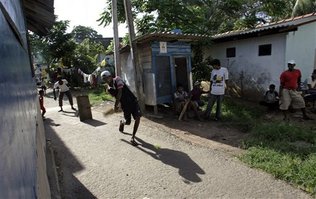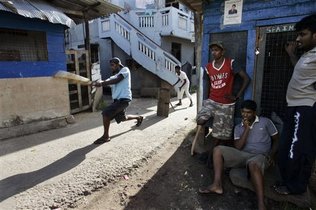
Ilankai Tamil Sangam
Association of Tamils of Sri Lanka in the USA
Published by Sangam.org
by Ravi Nessman, Associated Press in Miami Herald, August 31, 2008
|
"They think every Tamil-speaking person is a terrorist. They want to control us,"... [W]e need to be a lot more serious in finding the balance between democratic rights and human rights and the right security measures. We can't alienate an entire community, an entire section of the citizenry." |
COLOMBO, Sri Lanka -- People in the poor, mainly Tamil neighborhood in Colombo described it as a harrowing day.
It was 5 a.m. on a Wednesday when police started knocking on doors. They searched hundreds of homes, then forced thousands of men, women and children to get dressed and walk through the narrow streets lined with soldiers to a nearby sports field. Over the next six hours, authorities questioned, photographed and videotaped the neighborhood's inhabitants.
Still, few of those rounded up expressed surprise at the intrusion.
 |
Residents of Kimbulla Ela, a poor Colombo neighborhood also known as a hotbed of drug crime play cricket in one of the narrow streets in Colombo, Sri Lanka on July 16, 2008. Members of the minority Tamil community say police raids, harassment, arbitrary detentions and even abductions have become routine during the recent escalation in the 25-year civil war between the government, dominated by the Sinhalese majority, and the Tamil Tiger separatists |
Members of Sri Lanka's minority Tamil community say police raids, harassment, arbitrary detentions and even abductions have become routine in recent years as violence has escalated in the 25-year civil war between the government, dominated by the Sinhalese majority, and the Tamil Tiger militia fighting for a separate state in the island's north and east.
"They think every Tamil-speaking person is a terrorist. They want to control us," said Sanjeevi Ramiah, 47, one of the few residents of the Kimbulla Ela neighborhood willing to speak publicly about the July 2 raid.
While Tamils and human rights advocates complain about police excesses, most agree this Indian Ocean island nation is faced with a serious threat from the rebels.
The Tigers have been blamed for deadly attacks over the past year that have spread fear across the capital, Colombo, in the south. A June bombing on a crowded suburban bus killed 21 people, two days after a blast targeting the railroad in the city narrowly missed a passenger train.
"No one suggests for the moment that there should not be security measures and precautions," said Paikiasothy Saravanamuttu, executive director of the Center for Policy Alternatives think tank. "At the same time, we need to be a lot more serious in finding the balance between democratic rights and human rights and the right security measures. We can't alienate an entire community, an entire section of the citizenry."
Emergency regulations renewed by parliament each month give the government wide-ranging powers to arrest terror suspects and detain them indefinitely.
With each new attack in the capital, the complex web of checkpoints, road closures and random searches tightens. And many Tamils say their lives grow harder.
They say police assume they sympathize with the rebels' fight for a homeland for ethnic Tamils and single them out at checkpoints and during searches on buses.
 Many are routinely detained on minor infractions or for no reason at all, according to residents and human rights groups. Those who fled the northern war zone, where the rebels control a de facto state, say they risk arrest for not registering with police or for having overnight guests without police authorization.
Many are routinely detained on minor infractions or for no reason at all, according to residents and human rights groups. Those who fled the northern war zone, where the rebels control a de facto state, say they risk arrest for not registering with police or for having overnight guests without police authorization.
In June 2007, authorities briefly expelled more than 300 Tamils from Colombo boarding houses before the Supreme Court forced them to back down.
Following a pair of bombings in November, the government detained more than 2,000 Tamils in a mass arrest sweep, a common tactic after major attacks. It released nearly all of them days later after a groundswell of criticism.
In addition, nearly 200 Tamils have "disappeared" from the capital in recent years, said Mano Ganesan, an opposition parliamentarian who heads a group that catalogues the disappearances. The government denies any connection to the phenomenon.
"The root cause of this is the unresolved ethnic issue," Ganesan said, referring to the historic tension between the country's mainly Hindu Tamils and the mainly Buddhist Sinhalese. A Sinhalese nationalist movement arose after Sri Lanka's independence from Britain in 1948. The civil war began after a 1983 rebel ambush killed 13 Sri Lankan soldiers and sparked an anti-Tamil riot in the capital that human rights groups say killed more than 2,000 people.
Keheliya Rambukwella, a government minister and its chief defense spokesman, acknowledged Tamils were singled out for scrutiny in Colombo, but only because rebel attackers - who have killed members of all ethnic groups - routinely hid among the capital's large Tamil community.
"It is not a bed of roses. You have to undergo certain kinds of inconveniences," he said. "I really don't think it is discrimination. It is for their own good."
Tamils, just 18 percent of the country, make up as much as one-third of the capital's population, according to officials. And they are an important part of the fabric of Colombo. Some are doctors, lawyers or other wealthy professionals. Some, such as Rambukwella himself, are even government ministers.
While upper class Tamils are rarely inconvenienced, the majority of Colombo's Tamils are poor or lower middle class and feel powerless in the face of the mainly Sinhalese security forces.
Most of Colombo's Tamils have no connection with the Tamil Tiger rebels based hundreds of miles north of here or with their war. Still, many are finding it hard to get jobs because of suspicion, and some have stopped speaking Tamil on trains and buses, especially amid the post-attack security sweeps.
Veteran human rights activist Nimalka Fernando accused the government of "ethnic profiling" and said it was further polarizing an already divided country.
One man, who declined to give his name out of fear of retaliation by the security services, said police arrested him in February after someone he had worked with years earlier was found at a house where a bomb prematurely exploded.
The 28-year-old man from the rebel heartland of Killinochchi described a dreadful night of abuse, with police handcuffing him, stripping him, beating him and demanding he admit he was a rebel sleeper agent.
His wife complained to the government's Human Rights Commission and managed to get him released the next day. He did not leave his house for months afterward, worried the police would grab him again, he said.
The residents of Kimbulla Ela said the dawn raid on their poor Colombo neighborhood, also known as a hotbed of drug crime, was the second in two months.
Hundreds of soldiers in the streets funneled roughly 3,000 people to the neighborhood football field to answer questions about how long they had lived in the area and why they were there, residents said. Many missed work after waiting as long as six hours without food or water to be interviewed, said one man, a 31-year-old shop worker, who declined to be named out of fear of arrest.
Military spokesman Brig. Udaya Nanayakkara said authorities were looking for rebel agents and weapons caches, had raided other neighborhoods as well and were not singling out Tamils.
"There were so many threats to Colombo and the vicinity, therefore we had to carry out search operations," he said.
Ramiah, the resident of Kimbulla Ela who spoke publicly, said he appreciated the government's need to provide security, but insisted it was targeting the wrong people. Scores of residents of his neighborhood have been swept up in blanket arrest raids and none has turned out to be rebels, he said.
"They have to do security, definitely. We want to help them with that," he said. But, he added, "This is not real security."
© 1996-2025 Ilankai Tamil Sangam, USA, Inc.